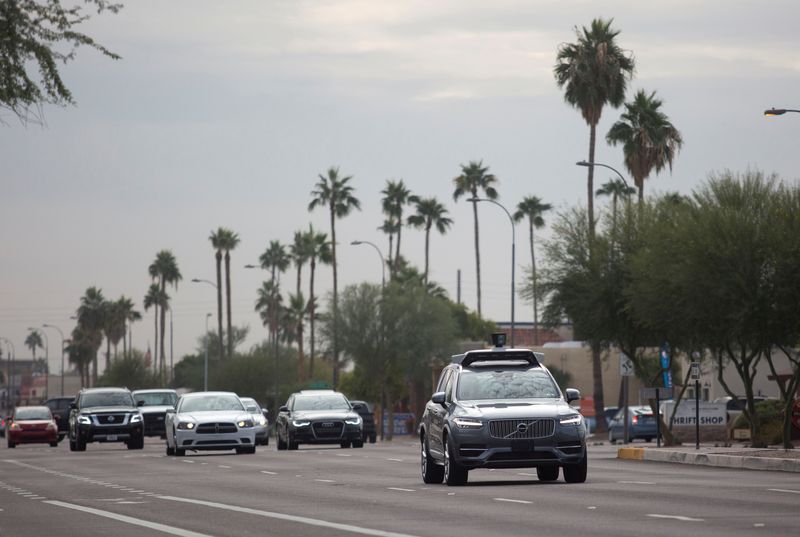U.S. will see ‘meaningful’ autonomous vehicle policy in 2020s -U.S. Transportation Secretary By Reuters
[ad_1]
 © Reuters. FILE PHOTO: A self driving Volvo vehicle moves along the streets of Scottsdale, Arizona, U.S., December 1, 2017. REUTERS/Natalie Behring/File Photo
© Reuters. FILE PHOTO: A self driving Volvo vehicle moves along the streets of Scottsdale, Arizona, U.S., December 1, 2017. REUTERS/Natalie Behring/File Photo2/2
By Tina Bellon
AUSTIN, Texas (Reuters) – U.S. Transportation Secretary Pete Buttigieg on Wednesday said federal policy on autonomous vehicles will undergo “meaningful” developments in the coming years, saying policy frameworks had not fully caught up with technological developments.
Speaking at the South by Southwest music, technology and film festival (SXSW), Buttigieg said regulation had to set boundaries for self-driving without stifling innovation in an industry that “is still largely in its infancy.”
“It’s okay to allow that experimentation to flourish up until and unless we start seeing a real escalation of some of the safety concerns,” Buttigieg said, adding that limitations on the amount of vehicles each company tests could function as “speed breaks.”
“I think we’re going to see very meaningful developments here in the 2020s,” Buttigieg said.
Congressional efforts to regulate self-driving cars have been stalled for several years, but U.S. regulators last week eliminated the need for manufacturers to equip fully autonomous vehicles with driving controls like steering wheels and brake pedals.
Tesla (NASDAQ:) Inc has released pilot software for what it calls its “Full Self-Driving” system to tens of thousands of Tesla owners for use on public roads across the United States.
The system has faced scrutiny from U.S. regulators over deadly crashes and traffic law violations.
Other automakers are more cautious amid the nebulous regulatory terrain.
Mercedes-Benz AG Chief Technology Officer Markus Schaefer told Reuters on Tuesday the carmaker “absolutely” wants a regulatory framework to protect the company before it releases its hands-free, semi-autonomous driving system in the United States to compete with Tesla’s Autopilot.
Buttigieg on Wednesday also said he wanted to improve the U.S. public transit system and encourage Americans to buy electric vehicles through government tax incentives to reduce emissions.
National U.S. transit use remains some 40% below pre-pandemic levels, according to data from mobility app Transit.
White House efforts to increase current $7,500 EV tax credits to up to $12,500 for union-made U.S. vehicles remain stalled in Congress.
Fusion Media or anyone involved with Fusion Media will not accept any liability for loss or damage as a result of reliance on the information including data, quotes, charts and buy/sell signals contained within this website. Please be fully informed regarding the risks and costs associated with trading the financial markets, it is one of the riskiest investment forms possible.
[ad_2]
Source link
 © Reuters. FILE PHOTO: A self driving Volvo vehicle moves along the streets of Scottsdale, Arizona, U.S., December 1, 2017. REUTERS/Natalie Behring/File Photo
© Reuters. FILE PHOTO: A self driving Volvo vehicle moves along the streets of Scottsdale, Arizona, U.S., December 1, 2017. REUTERS/Natalie Behring/File Photo2/2
By Tina Bellon
AUSTIN, Texas (Reuters) – U.S. Transportation Secretary Pete Buttigieg on Wednesday said federal policy on autonomous vehicles will undergo “meaningful” developments in the coming years, saying policy frameworks had not fully caught up with technological developments.
Speaking at the South by Southwest music, technology and film festival (SXSW), Buttigieg said regulation had to set boundaries for self-driving without stifling innovation in an industry that “is still largely in its infancy.”
“It’s okay to allow that experimentation to flourish up until and unless we start seeing a real escalation of some of the safety concerns,” Buttigieg said, adding that limitations on the amount of vehicles each company tests could function as “speed breaks.”
“I think we’re going to see very meaningful developments here in the 2020s,” Buttigieg said.
Congressional efforts to regulate self-driving cars have been stalled for several years, but U.S. regulators last week eliminated the need for manufacturers to equip fully autonomous vehicles with driving controls like steering wheels and brake pedals.
Tesla (NASDAQ:) Inc has released pilot software for what it calls its “Full Self-Driving” system to tens of thousands of Tesla owners for use on public roads across the United States.
The system has faced scrutiny from U.S. regulators over deadly crashes and traffic law violations.
Other automakers are more cautious amid the nebulous regulatory terrain.
Mercedes-Benz AG Chief Technology Officer Markus Schaefer told Reuters on Tuesday the carmaker “absolutely” wants a regulatory framework to protect the company before it releases its hands-free, semi-autonomous driving system in the United States to compete with Tesla’s Autopilot.
Buttigieg on Wednesday also said he wanted to improve the U.S. public transit system and encourage Americans to buy electric vehicles through government tax incentives to reduce emissions.
National U.S. transit use remains some 40% below pre-pandemic levels, according to data from mobility app Transit.
White House efforts to increase current $7,500 EV tax credits to up to $12,500 for union-made U.S. vehicles remain stalled in Congress.
Fusion Media or anyone involved with Fusion Media will not accept any liability for loss or damage as a result of reliance on the information including data, quotes, charts and buy/sell signals contained within this website. Please be fully informed regarding the risks and costs associated with trading the financial markets, it is one of the riskiest investment forms possible.